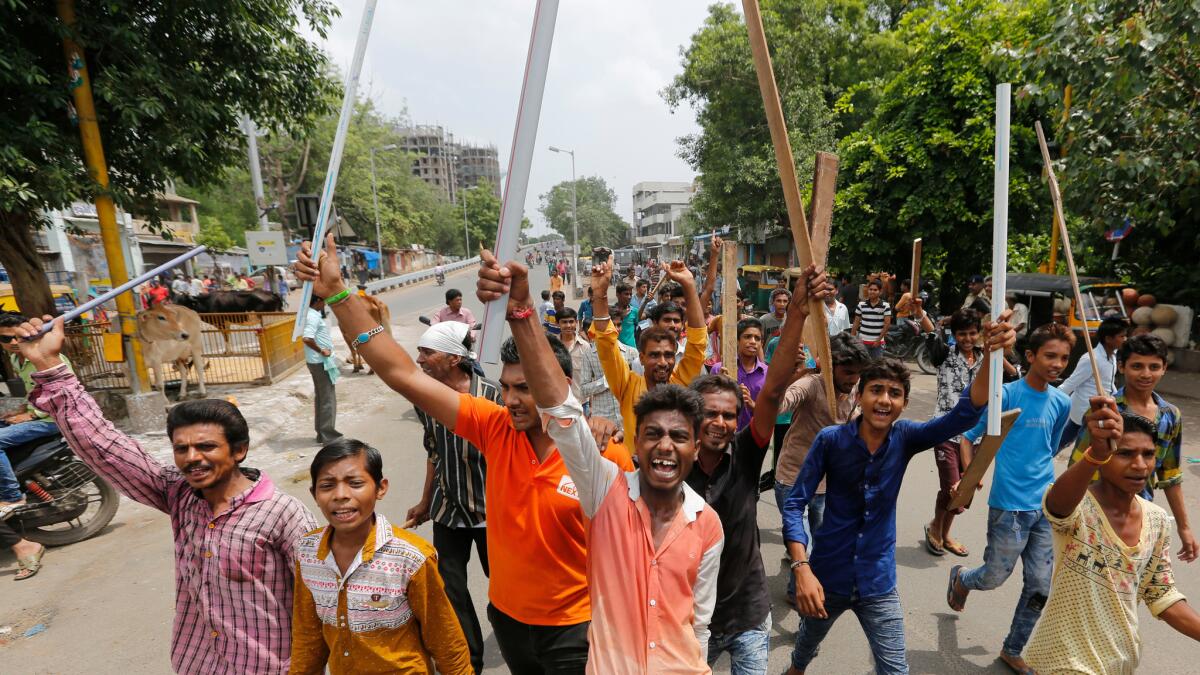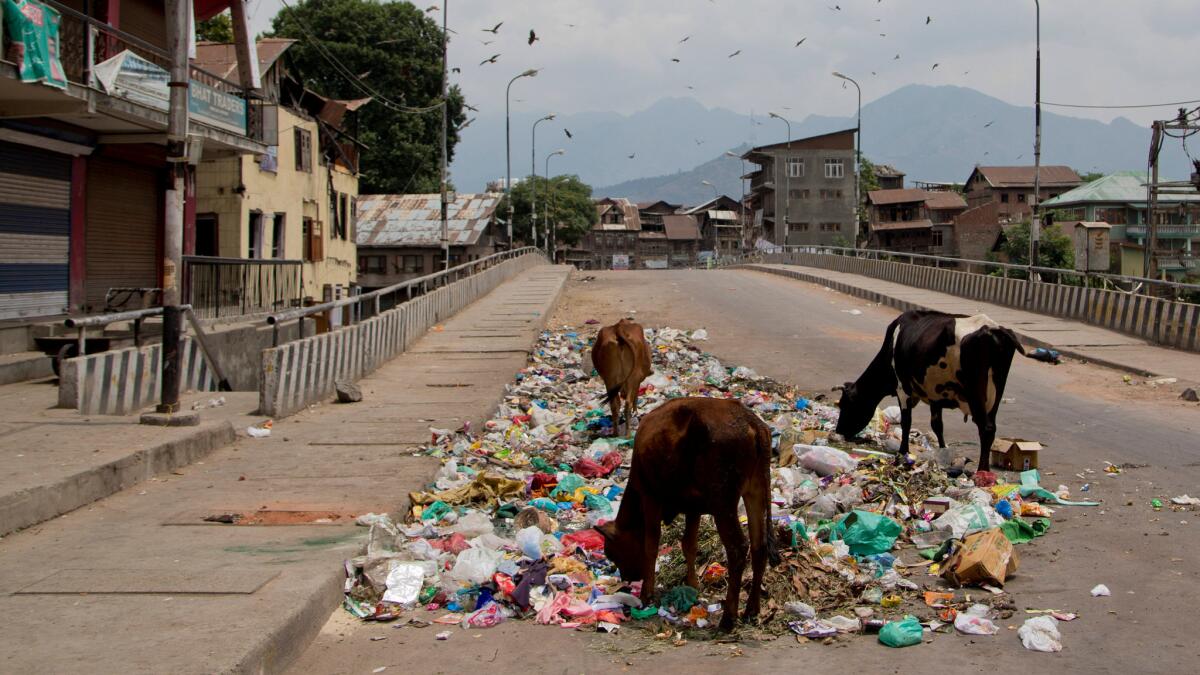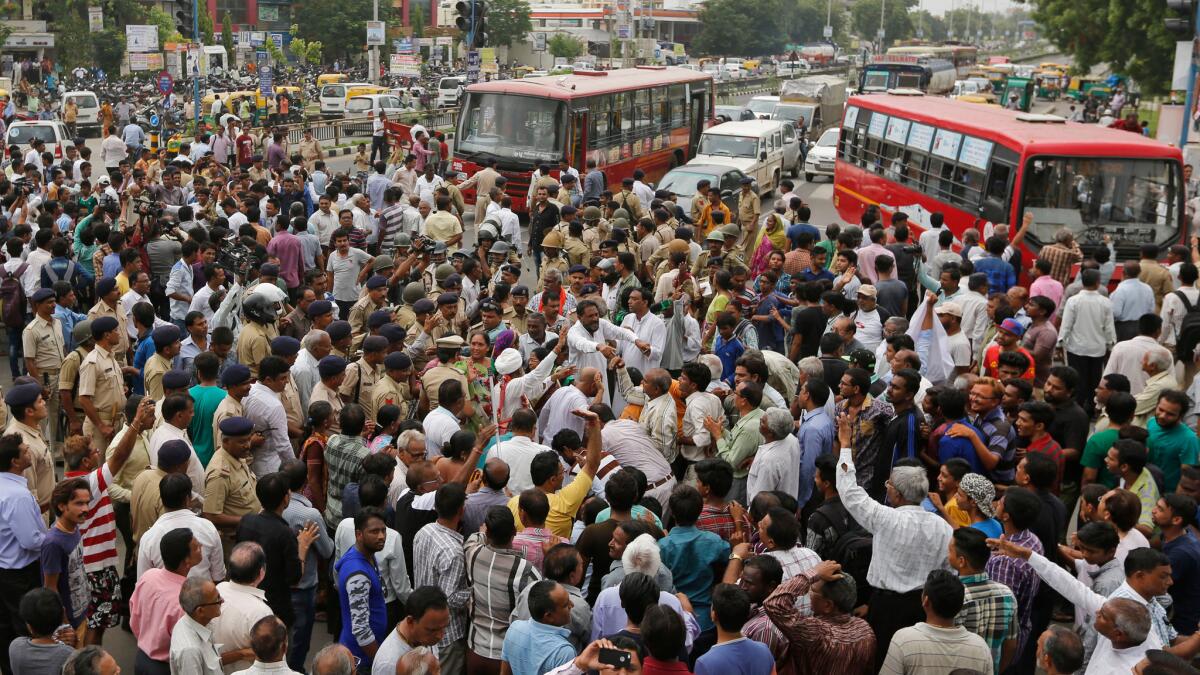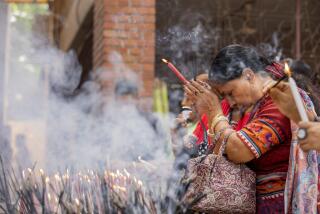Vigilante groups beat and kill to protect cows in India

Reporting from Mumbai, India — Ravi Shitole needed a transport vehicle. He had just made a purchase and wanted to haul the cargo back to his village, around 200 miles away.
But transporters refused to rent him a vehicle, for Shitole was taking the perilous risk of traveling with cows.
“I bought them so my family could have fresh and healthy milk,” said Shitole, who lives in the western state of Maharashtra and purchased 12 cows for himself and a group of friends. A friend had joined him to pick up the cows. “We spent the whole day looking for a vehicle. Eventually, we summoned our hometown and asked for an empty Tempo [truck] that came all the way from our village and took us back.”
Among upper-caste Hindus, cows are revered as sacred symbols of life. Even so, beef remains a major part of the diets of Muslims and Christians, as well as lower-caste Hindus, because it is a cheap source of protein.
An overwhelming majority of those working at cattle slaughterhouses or related trades are Muslims and Dalits, members of India’s lowest social class once known as “untouchables.”

Various states in India have different restrictions on cow slaughter, but even legal transportation or possession of cattle or beef has, in recent times, resulted in brutal and even fatal attacks by radical Hindu groups across India. The result: acute paranoia.
Shitole is Hindu, as is the friend who accompanied him that day, But to minimize risk, they started their journey at 2 a.m. Before leaving, they visited a temple and picked up a few threads considered sacred by Hindus and wrapped them around their wrists.
On their vehicle they mounted a saffron flag, a symbol of Hinduism that has been appropriated by radical groups. Saffron is the color of sacrifice. The driver dressed up in quintessential Hindu attire to leave no doubt that he, too, was Hindu.
“Yet, my heartbeats were pumping throughout the eight-hour journey,” Shitole said. “My blood pressure had drastically gone up by the time we safely got back home.”
While cow vigilante groups have been active in India for years, commentators believe they have been emboldened after the conservative Bharatiya Janata Party (BJP), with close ties to Hindu radical groups, came to power in May 2014 and Narenda Modi ascended to the office of prime minister.
See the most-read stories in World News this hour >>
“The force and the authority of the state are behind it now,” said Aakar Patel, a senior journalist who is head of the group Amnesty India. “Five or 10 years ago, we did have violence, but the vengeance of their activities across the country demonstrably shows these groups are emboldened in the last two years.”
Modi has not been prompt in denouncing killings, and his language has been far from forceful.
As recently as July 11, four Dalit men were stripped, tied to an SUV and beaten up in broad daylight in Gujarat, the home state of Modi. The victims had brought dead cows from another village and were skinning them when a group of six accused them of cow slaughter and took turns beating them.
As a result, though, massive protests by Dalit groups have erupted and spiraled across Gujarat, triggering violence that left one police officer dead. Mobs have taken to streets, torched state buses, blocked roads and, outside one district official’s office, dumped truckloads of carcasses.

On Monday, seven men attempted suicide to protest the July 11 beatings. Two more have attempted suicide since then and one died. It has forced the chief minister of Gujarat, Anandiben Patel, to take swift action. Sixteen vigilantes have so far been arrested in the case, she tweeted.
In the northern state of Haryana, a video that went viral in late June showed two beef transporters who were stopped by vigilantes. The 57-second video, shot by Gau Rakshak Dal, a group of so-called “cow savers,” shows the men sitting on the highway, being forced to eat cow dung. Their faces are swollen, and one of them is vomiting.
More than 200 cow-protection groups work in the national capital of Delhi alone, as reported by the Indian Express newspaper.
“We are bringing sanskaar [or values] back into society. Cow is our mother. I have been consuming cow urine for years. It purifies your soul,” Akhilesh Singh, a member of one such group, was quoted as saying in the report. Because of the BJP government, he added, “groups like ours now feel empowered.”
Some Indians have been killed by the cow savers.
In September 2015, a mob barged in the house of 50-year-old Mohammad Akhlaq in his village of Dadri in Uttar Pradesh, after rumors spread that he had eaten beef. The mob dragged him and his son out of the house and beat them with bricks. Akhlaq died. The son, Danish, was severely injured.
Later, it was reported that the meat in Akhlaq’s fridge was mutton and not beef. The criminal case is still pending and a lawyer for the accused recently produced a forensic report claiming the meat was, indeed, beef, though commentators have called the report a fabrication.
In Uttar Pradesh, consumption and storage of beef is not a crime. But, in a surprising twist, a court ordered police to file a complaint against Akhlaq’s family for allegedly slaughtering a cow. Commentators have furiously criticized the move, saying it tacitly justifies murder for alleged cow slaughter.
“It sends a very negative and nasty message,” said Patel, the journalist. “It shows us a very primitive people to the world. If it is excusable and justifiable to murder a man and then charge his family, it says a lot about us.”
Akhlaq’s family had been living in Dadri for generations, and never faced any communal strife, the family had said.
But since his lynching, local BJP leaders have pushed for a the family to be prosecuted for cow slaughter. Sakshi Maharaj, a BJP lawmaker, was widely quoted saying, “We are ready to kill and get killed for cows.” Another Hindu radical group has demanded death for Akhlaq’s family.
Within weeks of Akhlaq’s death, two killings transpired in a span of four days. An 18-year-old truck driver was burned to death in Jammu and Kashmir state, apparently because he was wrongly suspected of transporting beef. A 20-year-old man in Himachal Pradesh state was killed by villagers who suspected he was involved in cattle smuggling.
In March of this year, two Muslims were found hanging from a tree in the eastern state of Jharkhand. One, Mazlum Ansari, was a 32-year-old cattle trader, while the other, Imteyaz Khan, was the 13-year-old son of a cattle trader.
The family of Ansari later said that a group of men had threatened him a month before his death while confiscating eight of his oxen.
Patel said India’s democratic institutions and promotion of nonsectarianism had suppressed such sentiments for years, but now, with the ascent of the BJP, the country was experiencing the tyranny of the Hindu majority.
“It is not surprising,” he said. “But it is shameful that we are living through a time when we have to see this in 2016.”
Despite the obsession of some to protect the cow, India ironically remains one of the largest exporters of beef.
Parth M.N. is a special correspondent.
MORE WORLD NEWS
With smuggled sperm, Palestinians sire children from behind Israeli prison bars
French wonder after latest terror attack: What can we do to feel safe?
What’s hot in Japan right now? Los Angeles, circa 1976
More to Read
Sign up for Essential California
The most important California stories and recommendations in your inbox every morning.
You may occasionally receive promotional content from the Los Angeles Times.










